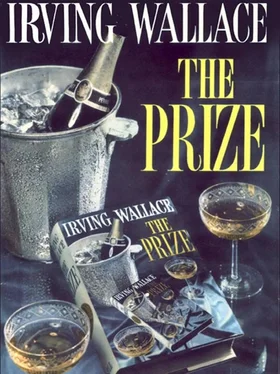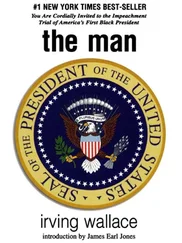At the door, Krantz paused. ‘Utmost discretion, Daranyi, I warn you.’
A smile enlivened Daranyi’s face. He made his joke. ‘I have a neck, too. I like it.’
Krantz grunted. ‘Then it is settled. At any hour of the ninth, when you are ready, telephone my private number. I will be waiting in the apartment until you call. Then I will expect you right over.’
‘I hope I have something,’ said Daranyi.
‘I expect you will,’ said Krantz.
He left. The meeting was over. Daranyi stared absently at the closed door. He wondered what was behind all this. Soon enough, he might know. That was the sport of it, that and the money.
He returned to the end table and took up the biographies that Krantz had left behind. Slowly, he read. His forty-eight hours of voyeurism had begun.
At exactly 11.05 on the same morning-the air still as frozen as it had been in the earlier hours, but with the landscape of Djurgården now painted zinc-grey rather than black-Denise Marceau had been driven through a rear gate behind Åskslottet, and had seen Dr. Oscar Lindblom through the windshield, slapping his arms and waiting at the forest path ahead.
As he assisted her from Hammarlund’s Bentley, a luxury that she enjoyed, so fitting for her mood, she was pleased to observe that Lindblom appeared more handsome, more definite, more manly than she had remembered. His hair has been caught by the wind, and rumpled, and the weather had made his cheeks ruddy and alive. The woollen muffler he had bound about his neck and shoulders-the muffler with no overcoat-gave him an indefinable dash. He looked less like a cavity, praise the Lord, she decided, and she went cheerfully on his arm through the rows of stripped trees. Lindblom said that there were some tame deer in the forest, but Denise saw none.
The private laboratory, a one-storey cement building, thirty by sixty feet, stood in a clearing, isolated from all other construction and habitation. Although the inside of the laboratory-two rooms and a bath-had the familiar appearance of a dozen laboratories Denise had known in France, this one proved infinitely more up-to-date.
Lindblom, attentive as a military school junior, had helped her off with her heavy grey strolling coat. She had been pleased, certain that she had not imagined it, that he had furtively admired her new silk shantung dress, low-cut and stylishly short for daytime wear.
After lighting her cigarette, he had guided her proudly through the larger room, the work section of the laboratory, meticulously pointing out and discussing each glass still and its contents, each high vacuum pump, the temperature gauges and heaters and flasks and beakers, the spectrophotometer, the high-speed centrifuge, the experimental rodents in stainless steel cages. Despite her lack of interest in science at the moment, Denise was impressed at the cash outlay the private laboratory represented.
As they marched up and down, past the counters, Lindblom discoursed with nervous enthusiasm about the work in progress. His love for algae strains and soyabean nodules and Rhodophyceae and Chlorella dinned on her eardrums. His hatred for the chemicals of natural food, his devotion to synthetics, were passionate. What interested Denise was not the knowledge that Lindblom imparted, but rather that he possessed any range of emotion at all. She wondered if only the chemistry of food stimulated him. She wondered if he would react, similarly, to the chemistry of woman.
She listened occasionally, but for the most part she did not listen at all. It was one of her gifts: the ability to shut off almost all human sound, yet to know intuitively when to nod and when to give assent and when to interject a comment of praise or displeasure. She had employed this ability through the laboratory tour and lecture. She had more momentous things in her head.
From the moment of her decision at the Hammarlund party last night, until the moment Claude had left her this morning, she had been of cheerful disposition, secure with her secret inner hope. This sudden change in her temperament had confused and dismayed Claude, and she had seen it in him. She had even guessed that he might be suspicious of her. At the end of breakfast, in the hotel suite, he had interrogated her carefully about her activity and enjoyment of the Hammarlund meeting. He had probed, and for the first time since her humiliation, she had felt real superiority.
The odds, she had known, despite her secret inner hope, were against her still. Gisèle’s imminent coming from Copenhagen might obliterate her entire effort. Still, she had made up her mind to do something, to make a fight of it, and that was heartening.
But her effort, she had known, was yet to be launched. Last night, she had made the crucial initial decision. In this laboratory, this morning, she would have to make the ultimate decision. And, once it was made, she would have to see it through.
Trailing Lindblom, she peered at her watch. She had arrived at 11.05. It was now 11.55. The zero hour that she had set herself loomed close. The ultimate decision. Question One: Should she do it? There were two courses open: (a) mild flirtation, a holding of hands, an embrace, a kiss, romantic whispering, to be followed by similar meetings devoted to the same and no more; or (b) sexual intercourse.
Instinct advised her that moderation would not work. Claude’s infatuation-hypnotized as he was by Gisèle’s sexuality-would not be shattered by mere retaliatory flirtation. She could not play-act the pretence that it was more, and she knew that Lindblom was even less capable than she. Claude would view the flirtation as a juvenile’s revenge, rather ridiculous, rather foolish, a pathetic joke. On the other hand, illicit love had a sweeping power that could bring real response. Here, no play-acting would be demanded of Lindblom. He would be her lover and know it and show it. And real possession of her body, unviolated by another since her marriage, would be a shattering blow to Claude’s ego. If it was not, her marriage was done anyway, and nothing would be lost. But if his ego was injured, and what remained was jealousy, there was hope.
She followed Lindblom about the laboratory and continued to reason with herself. She was satisfied that Question One had been resolved. Should she do it? Yes, she should. Now Question Two: Could she do it? This was a difficulty. She had been raised a French Catholic. Her parents had been stern overseers. Yet, in young maturity, free of them and adrift from the Church, she had enjoyed three brief but earnest affairs with male students of the Sorbonne. But after she had met Claude, and made her vows, she had not once cheated, not once flirted, despite the legendary nonsense about the loose morals of French women. She had not even thought of such a thing.
She walked and deliberated: but now, it was all different, and Claude had made it so. What vow policed her? The vow had been mutual, in partnership, and he had broken it. What chastity need she preserve and for whom? And what fears need she have? She was a woman, and that made it easier. She was a woman scientist, and that made it far easier. She was a woman scientist of forty-two years, matter-of-fact, unromantic, not widely experienced but fully experienced, and that made it far, far easier.
Two factors made it possible and a necessity. Lindblom had halted to point out a beaker of liquid. Standing there, staring at it, by some curious metamorphosis, the beaker became a vessel, and the association was Gisèle Jordan’s young vagina given to Claude, to her husband, and his taking it, and she hated the image and drove it off, but her fury with the offenders in her life remained. Then, to forget the image, to please Lindblom, she had stepped beside him to lean closer to the beaker, and inadvertently, she had leaned forward across his outstretched arm so that her generous breasts, loosely bound in a thin lace bra, had pressed deeply against his arm. She had felt, with excitement at her power, the sudden rigidity of his arm, of his entire frame beside her, in fact, and she knew at once that he could be had with ease and that it would be painless. And so Question Two was answered. Could she do it? She could, indeed.
Читать дальше












